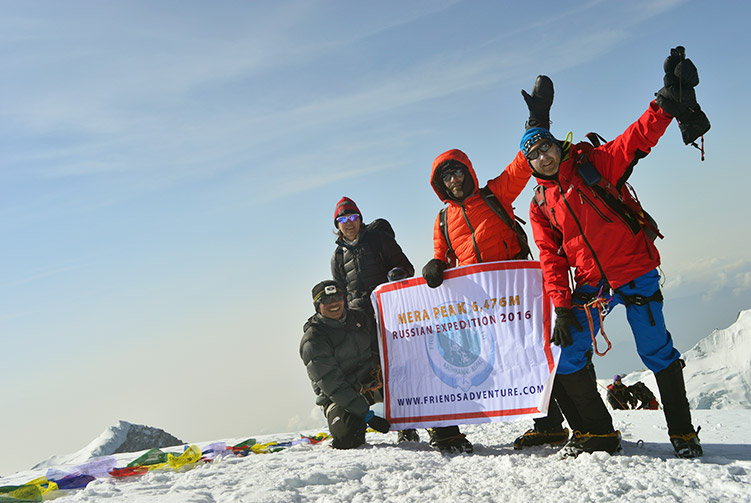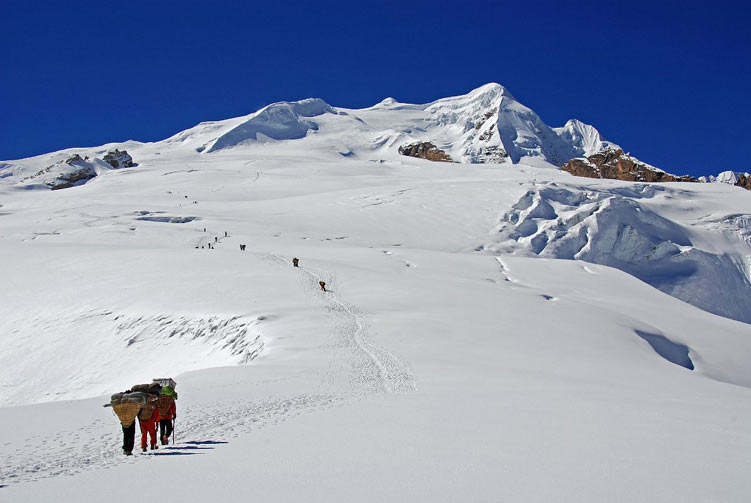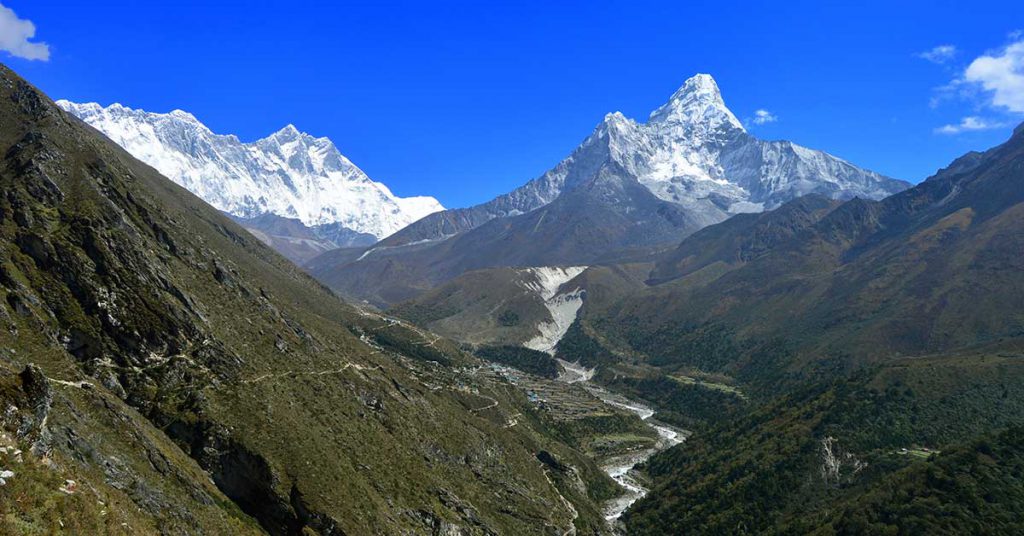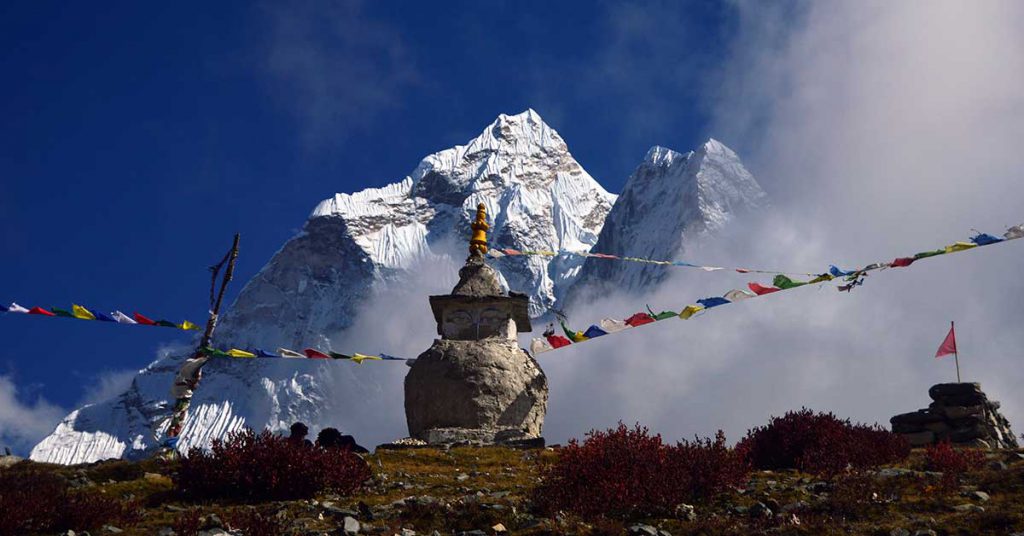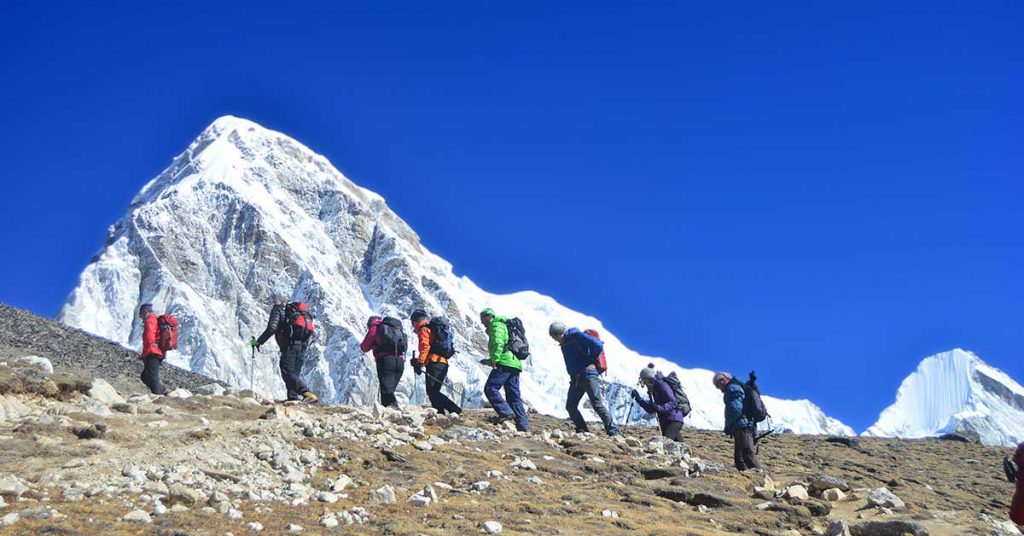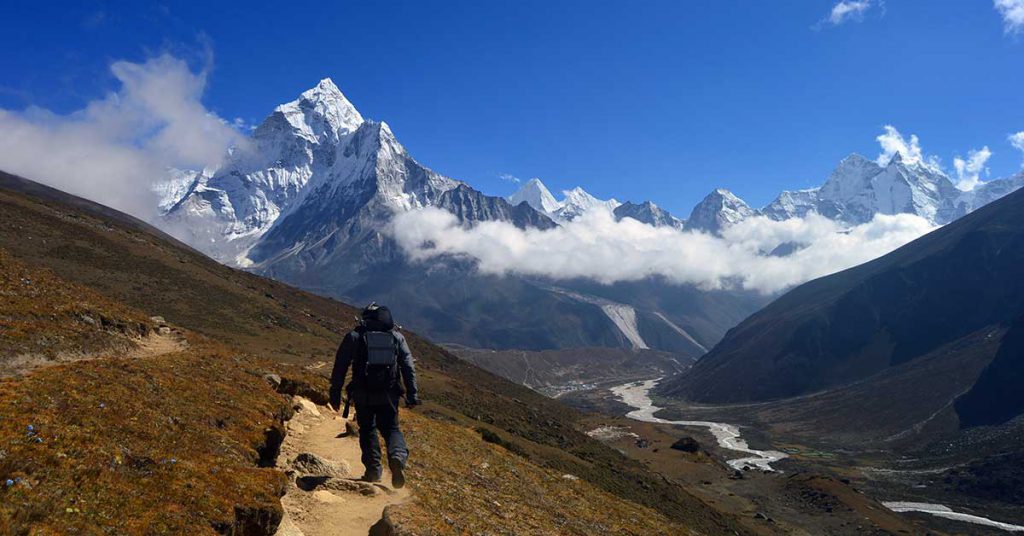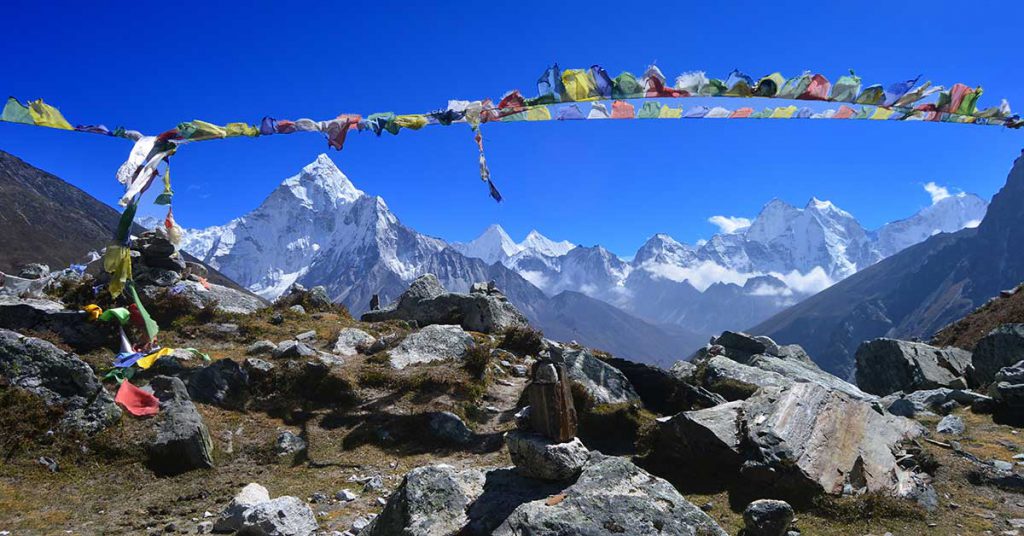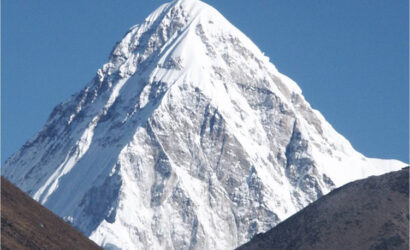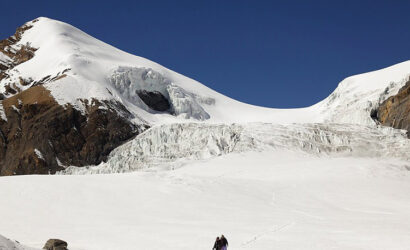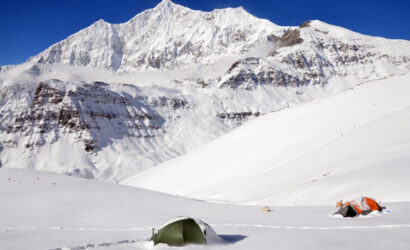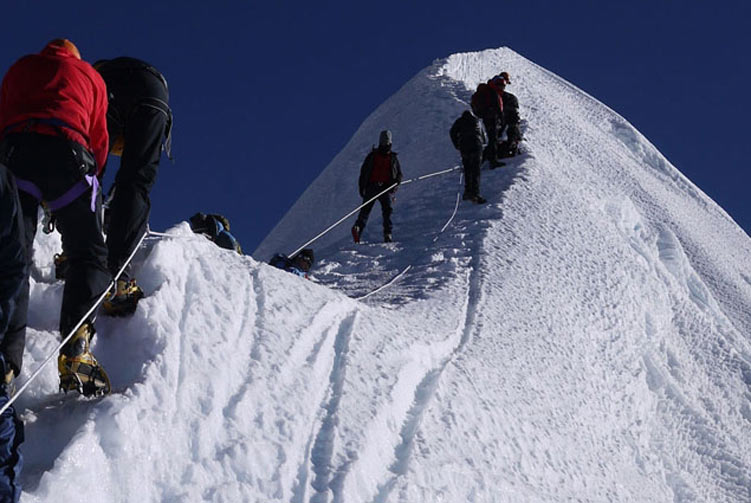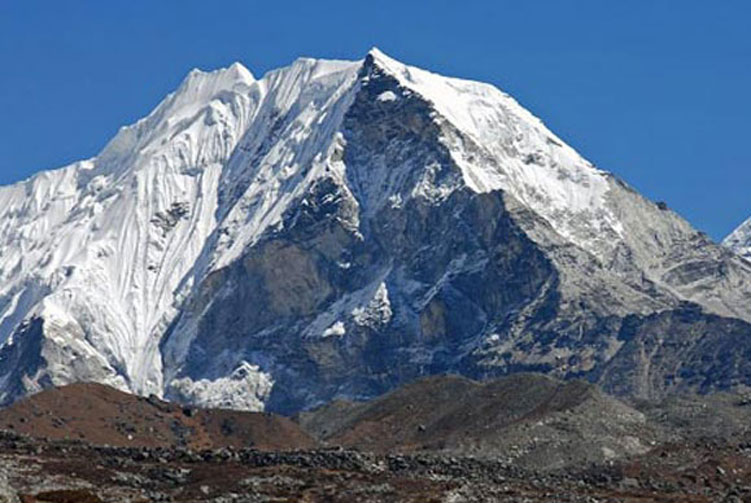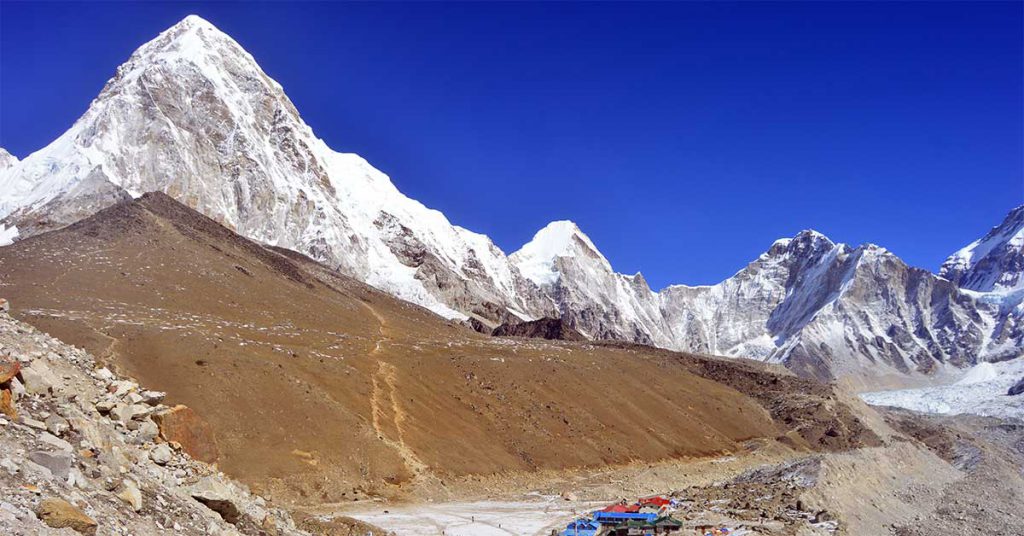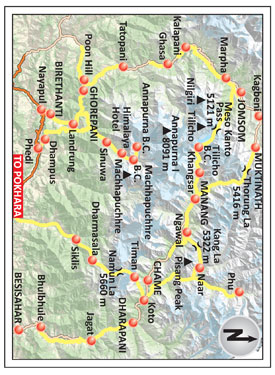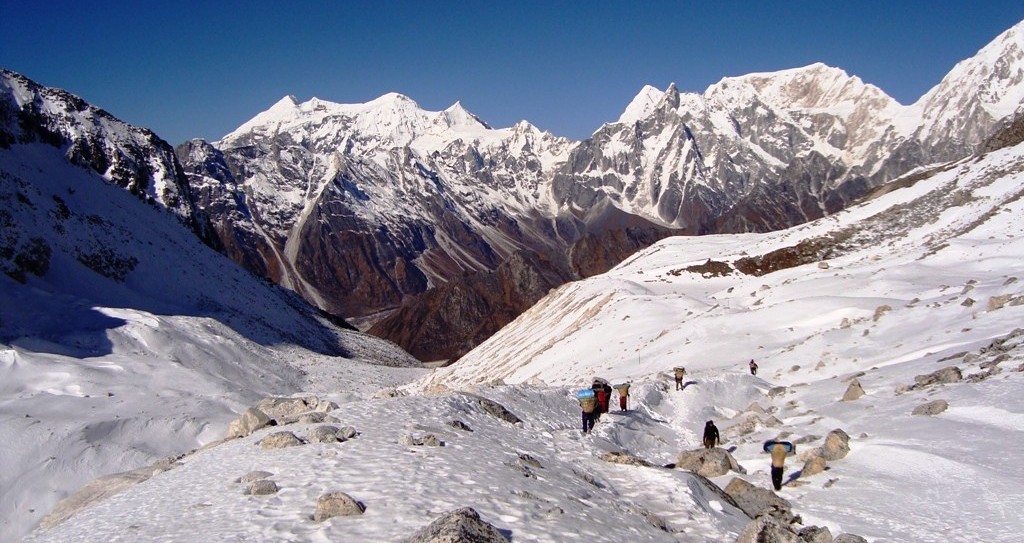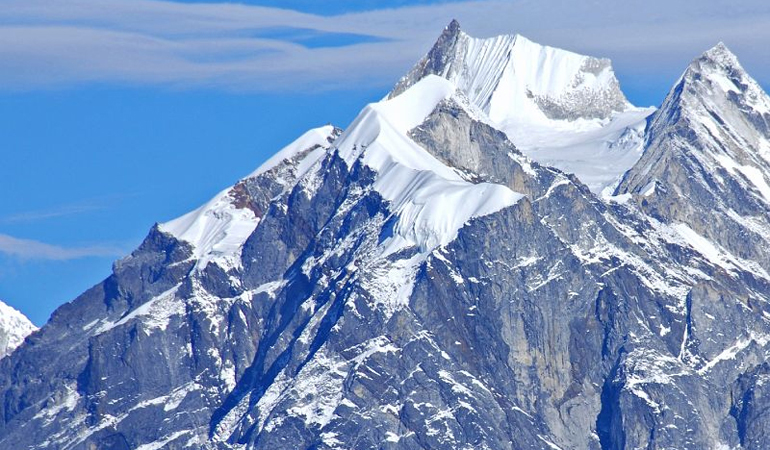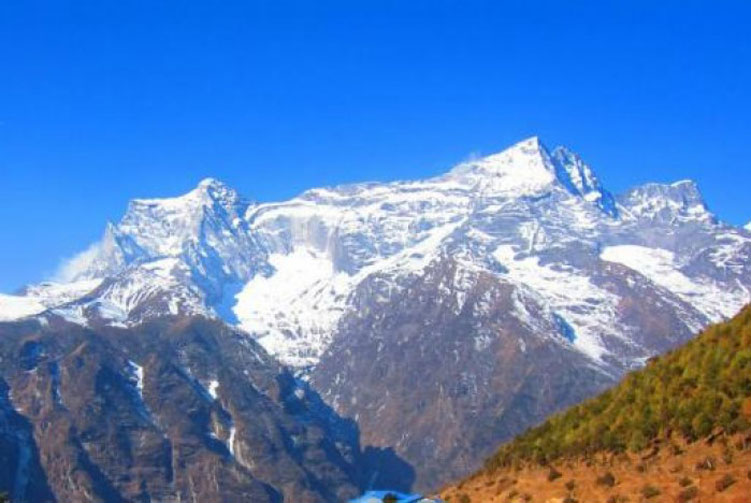Mera Peak is the highest peak among trekking peaks; It lies in Hinku valley of the Khumbu region. Before attempting a higher mountain it would be worth trying Mera Peak for acclimatization purposes. All the hardships will be forgotten once you are on the summit because from the top of Mera the gigantic view of Everest, Lhotse, Choo yu, Nuptse, Makalu, Kanchenjunga & many more peaks are visible in 360 degrees angle.
The view from the Mera Peak summit is one of the finest in the Himalaya with five 8,000m peaks visible: Mount Everest, Lhotse, Cho Oyu, Makalu, and Kangchenjunga, as well as other Himalayan peaks linked below. The standard route from the north involves high altitude glacier walking. The ease of reaching this elevation may be its biggest danger but good weather and snow conditions are, of course, necessary for safety and success. The west and south faces of the peak offer more difficult technical routes.
Overview
Mingbo La Pass
Mingbo La can be defined as an adventure trekking destination in Himalayas. It is technically pass up to Khumbu valley via the ridge of Mt. Amadablam. There are numbers of huge glaciers along the trail. The crossing of the pass requires the use of technical climbing equipment and trekkers must be skilled in the use of this and be prepared. It holds breathtaking Himalayan scenery while you are in trekking.
Trip Highlights
- Cultural Sightseeing tour of Kathmandu
- You'll be surrounded by stunning Himalayan landscapes, with towering peaks and glaciers.
- It's an exciting and challenging adventure, suitable for those with some climbing experience.
- You'll get to immerse yourself in the unique Sherpa culture of the Everest region.
- Mera Peak is over 21,000 feet (6,476 meters) high, providing a real sense of accomplishment.
Itinerary
Today is the day of your arrival in Kathmandu, Nepal. As soon as you come out of the Kathmandu airport, you will find our representative waiting for you in the waiting area right outside the arrival lounge. You will be warmly greeted and welcomed by the representative and led to the vehicle. Our vehicle will take you to the trip hotel, most of the time in Thamel, that is 20-30 minutes drive, depending upon traffic, from the airport.
Enjoy your breakfast at the hotel. We come to take your for a wonderful cultural heritage tour of Kathmandu valley. As part of the tour, we are going to visit four of the UNESCO Heritage monuments in Kathmandu valley. The places we visit today are incredible mixture of culture, history, spirituality, art and stories. Overnight in Hotel.
Swoyambhunath
Believed to have been created on its own, this Budhhist stupa is the oldest of all the monuments in Kathmandu valley. Standing atop a small hillock, Swoyambunath, known as monkey temple amongst tourists, provides a fascinating view of the valley, surrounding hills and snow-capped mountain at the distance on a clear day.
Patan Durbar Square
One of the three medieval palace squares, Patan Durbar Square holds its medieval art and architectural grandeur. Amazing skill of the artisans is evident in each and every building that stands in the square. The square comprises of medieval palace, temples and museum.
Pashupatinath
This site is the most sacred Hindu temple area in the country. But, as the temple is strictly a Hindu only area, non-Hindu tourists go there to watch the unique Hindu cremation rituals on the bank of River Bagmati. The death rites of Hindu family there are so engrossing and heart-touching which make you feel the moment. It’s not any kind of intrusion in being there and watching somebody being cremated in an open ground. It’s a great cultural experience.
Boudhanath
This giant Buddhist stupa is considered as the biggest one in the world. This small square with giant shrine has a powerful presence of the spiritual vibrations. It’s an important pilgrimage site for the people following Tibetan Buddhism.
You’ll board a scenic flight from Kathmandu to Lukla. Upon arrival in Lukla, your trek commences as you make your way towards Chutenga, where you’ll spend the night in a lodge.
Today’s trek involves crossing the Zatra La Pass, offering breathtaking mountain views. After the pass, you’ll reach Chatrarbu where you’ll spend the night.
We take the breakfast at the cool weather of Thuli Kharka before we get ready for the trek of the day. We trek to Kothe today mostly on downhill towards Kothe. We can enjoy beautiful Hinku valley view and the view of mountain peaks including Mera Peak. It’s comparatively a short day walk that allows us ample time to exploit the joy of trekking and of the surroundings. Once we reach Kothe, we will have time to explore around.
Our walk to Thaknak today takes us through the trail that brings beautiful views of the valley and the surrounding landscapes. In about six hours of walk up and down the hill towards Thaknak, we will come across so many wonderful things along the trail that will make our day. Once we reach Thaknak, we establish our camp and laze around enjoying the pleasant atmosphere.
Our walk to Thaknak today takes us through the trail that brings beautiful views of the valley and the surrounding landscapes. In about six hours of walk up and down the hill towards Thaknak, we will come across so many wonderful things along the trail that will make our day. Once we reach Thaknak, we establish our camp and laze around enjoying the pleasant atmosphere.
It is our acclimatization break at Khare today. We can utilize our time exploring around Khare. We go for a hike to a nearby peak to have captivating views of Mera Peak and Mera La. A full day exploration and rest at and around Khare prepares us well for further adventure of trekking tomorrow onwards towards Mera Peak.
Our trek for the day today takes us to Mera Peak Base Camp. Although a short walk for the day, it takes us through several wonderful sights all throughout. We reach Mera Peak Base Camp early in the afternoon that leaves us with ample time to adjust and acclimatize. We laze around the base camp trying to get familiar with the thinning level of oxygen in the air.
We wake up for crisp morning weather at the base camp of Mera peak that we are to summit. As soon as we relish our breakfast, we get ready to trek to the High camp where we will spend the night today. When we reach the high camp, we will be already standing at the elevation of 5,780 meters above sea level. As our tented camp gets ready, we exploit the beauty of the view from there.
It is the highlight of the trip today as we are going to go for the summit of Mera Peak, our destination. Our day starts really early, right after the middle of the night. Except the final section near the summit, the whole section is non-technical. We reach the summit with the first rays of the day over the Himalayan peaks. Impressive view the mountains like Mt. Everest, Lhotse, Makalu, Kanchenjunga, Cho Oyu etc. makes our time unforgettable.
After spending some beautiful moments at the top, we start descending the mountain. We descent back to base camp through high camp and walk all the way back to Khare to stay overnight.
We have this day as contingency to make up any possible delays in the climb. If this day is not used, we will trek back to Kothe.
Continuing your trek, you’ll reach Seto Pokhari, where you’ll camp for the night. The stunning landscapes persist.
Today’s hike takes you to Panch Pokhari, another picturesque campsite nestled in the Himalayan wilderness.
You’ll cross the challenging Amphulaptsa Pass, then proceed to Chhukung where you’ll stay in a lodge. This pass offers awe-inspiring views but requires careful navigation.
A fresh morning with the view of mountain peaks makes our breakfast even tastier. Filled with the energy, we are ready for the day to walk to Tengboche. The first section of the walk gently climbs and then goes much flatter before descending to the river and cross a suspension bridge. After crossing the suspension bridge, it is obvious that the trail is ascending towards Tengboche.
We reach Tengboche to be greeted by the spectacular view of Mt. Ama Dablam along with the view of the Mt. Everest and other peaks around. Apart from enjoying the view of the Himalayan peaks, we can explore the famous Tengboche Monastery where the first Everest Summiteer Tenzing Norgay Sherpa once lived as a monk. Overnight in Lodge
The journey back down to Namche Bazar will be of around eight hours. Leaving the Everest and other mountains in the region far behind, we descend long hours down to Namche Bazar. We can take some relaxing stroll around Namche Bazar in the evening or just stay inside the comfort of the lodge. Overnight at a lodge.
The final day of this trek is eventually here today. We walk back to Lukla via Monjo and Phakding along the Dudh Koshi River. A round trip on the Everest Base Camp trail comes to end here. We celebrate the end of the trekking part of the journey and thank our wonderfully amazing supporting crew members for their service and effort to take us to the base camp and back safely. Overnight at a lodge.
We get ready for the flight back to Kathmandu. We board the plane at Lukla airstrip and fly back to Kathmandu. Once we land in Kathmandu airport, we go to hotel and spend the whole day at leisure on our own. Finding relieving massage, good food, souvenir shopping, and wandering around can keep you busy for the day.
A farewell dinner is scheduled for this evening. We will let you know the departure time for dinner once we reach Kathmandu.
This is an additional day in the itinerary to compensate any possible delays on the trekking or cancellation of the flights. We extremely recommend that you have at least 2 extra days after the itinerary days so to maintain any possible delays or cancellation of the flight. If everything goes without any problem, you can utilize those extra days doing some other activities.
The final day of the trip, we drive you to airport for your scheduled flight homebound or other destination. We will pick you up 3 hours prior to your flight schedule.
The Trip Cost Includes
- Airport Pick and Drop in Kathmandu by Private vehicle.
- Welcome and Farewell dinner with cultural program.
- 4 Nights Tourist Standard Hotel Accmmodation in Kathmandu with B/B basis.
- Half day guided city tour with entrance permit.
- Round Flight ticket for Kathmandu-Lukla-Kathmandu with airport TAX.
- Standard Lodge Accommodation (best available) with twin sharing basis during the trek.
- Full Board Meals (3 Meals a day) while on the trek.
- Trekking Permit and Trekker's Information Management System (TIMS) card fees.
- Professional & highly expertise government licensed holder Trekking Guide.
- 2:1 Porters to carry luggages.
- All expenses of the staffs (Guides/Porters) that includes Food, Accommodation, Salary, Insurance, Equipment during your travel period.
- All the necessary trekking gear for porters like jacket /trousers, trekking shoes, gloves, shocks, sunglasses etc.
- Friends Adventure Team's Sleeping Bag, Walking Poles and Duffel Bag, to be return after trip completed.
- Comprehensive First Aid Kit.
- Arrangement of all rescue and evacuation promptly, in Worst Condition
- Group Trekking Gears.
- Trekking Map, Friends Adventure Team's special Souvenir.
The Trip Cost Excludes
- Any packed food/snacks, aerated drinks, energy drinks, mineral water, alcohol, cigarettes, chocolates, nutria-bars.
- All desserts, sweet things like chocolate, cake, pie, pudding.
- Items of personal nature, Laundry Expenses, Tips.
- Clothing, Packing Items or Bags, Personal Medical Kit, Personal Trekking Gears.
- Any additional staff other than specified.
- Medical and Travel Insurance and Emergency rescue by any means of Transportation including Helicopter evacuation if required.
- Rescue, Repatriation, Medicines, Medical Tests and Hospitalization expenses.
- Airfare of international flights.
- Nepal entry visa fee (Visa issuance is easy at the arrival).
- Hot shower and battery charging on the tea houses.
- Any other item not included in "Cost Includes" Section.
Frequently asked Questions
Island Peak Climbing involves reaching the summit of Island Peak, a popular mountain in the Everest region of Nepal.
No, it’s not recommended for beginners. You should have prior trekking and some basic climbing experience.
The best times are spring (April to May) and autumn (September to November) when the weather is most favorable.
Yes, you should get training in essential climbing skills like using ropes and ice axes.
You can rent some equipment locally, but it’s best to bring your personal gear, especially items like well-fitting boots and clothing.
While there are no strict age limits, climbers are generally expected to be in good physical condition. It’s more about fitness than age.
Altitude sickness can occur at high altitudes and can be dangerous. Proper acclimatization, staying hydrated, and following your guide’s advice can help prevent it.
You’ll stay in tea houses or lodges during the trekking portion and eat locally available food. At higher altitudes, the options may be limited.
Climbing Mount Everest is a different and much more challenging endeavor that requires extensive training and permits. Peak climbing trips typically do not include an attempt on
Yes, travel insurance that covers emergency evacuation and medical expenses is essential. Check that it also covers high-altitude activities.
Prioritize cardiovascular fitness, strength training, and endurance exercises. Hiking and trekking in your local area can also help prepare you for the altitude.
The cost can vary depending on the tour operator, the services included, and the duration of the expedition. On average, it can range from a few thousand to several thousand dollars.
Yes, many travelers choose to explore other parts of Nepal, like Kathmandu, Pokhara, or go on other trekking adventures after their peak climbing expedition.
Respect local customs, avoid littering, and use designated trails. Hiring local guides and porters also supports the local economy.
On average, you walk about 4 to 6 hours per day. One or two days can be as less as 3hrs and one or two days can be as long as 7hrs.
Yes, you can charge batteries en route. Charger should be brought. There are hot shower facilities as well. You may have to pay certain amount for both ($1-$2). Negotiate. Also, hot water facility could be free at lower elevation.
No. There are no ATMs on this trek route. You will have to draw enough cash in Kathmandu/Lukla or Namche. There are a number of ATMs in these cities. Everything is paid in Nepali rupees. So money should be exchanged before the start of the trek.
Yes. Internet can be accessed in most places. Sometimes, there might be some technical problems. Internet in Nepal is not as fast as you are used to and at times you can just lose connection.
No, it’s not strictly necessary to hire a guide or trekking agency for Island Peak Climbing, but it’s highly advisable, especially if you’re not an experienced mountaineer. Guides and agencies provide essential safety, local knowledge, and logistical support. They help with permits, navigation, and emergency situations, making your climb safer and more enjoyable. While it adds to the cost, the benefits of having a guide or agency often outweigh the expense, particularly for your safety and overall experience.
For Everest region, pay for guides range from $20 to $30 per day and porters take $15 to $25 per day.

